Afghanistan army relying on Australia’s help to keep the country together
AFGHANISTAN is still a hotbed flooded with terrorists. As the official start of the ‘fighting season’ begins we visit the embattled country to investigate why Australia is there.
World
Don't miss out on the headlines from World. Followed categories will be added to My News.
AS he strides through the pristine corridors of the Afghan National Army’s newest training college, Colonel Aziz Niazi’s eyes inflame with passion when asked about the multiple insurgent groups besieging his capital city.
In Kabul city a suicide bomber had that week detonated his chest and killed 69 mostly women and children, a day later 18 police and soldiers were killed, a day later another 11 soldiers, the week before two police officers, the month before 30 mostly teenagers at a Persian New Year’s Eve party.
The list goes on back to the start of this year with 100 slain when an explosives-packed ambulance pulled up near the European Union headquarters in downtown Kabul.
“They are not the enemy of Afghanistan, they are the enemy of the world, they don’t kill Afghans, they kill humans,” the boss of the Afghan National Army Sergeant Major Academy says.
MORE: Foes become friends on the frontline
REVEALED: Shorten’s surprise visit to ‘modern Anzacs’
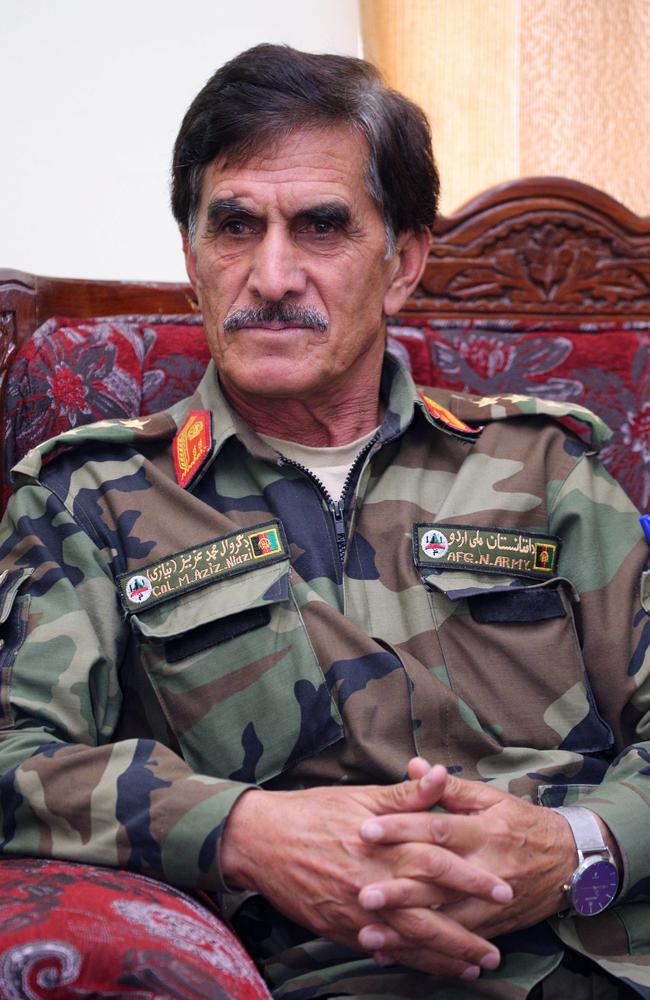
“This is why we need Australia here.”
Or at least why they need the ADF with 300 personnel peppered about the embattled country, embedded in to train, advise and assist programs designed to help Afghans fight a conflict that is tearing the country apart.
News Corp Australia visited ADF troops at various camps and outposts in the country and experienced first-hand their critical mission mandate that has largely gone unreported. But is remarkable in both its depth, breadth and unique nature and involves Aussies as young as 19, far from home and the comforts enjoyed by their families and mates.
But while the colonel’s observations ring true, the bigger picture is about what would happen if Afghanistan was allowed to fall and what that would mean for the rest of the world.
This is not just a noble mission to save Afghan lives from a bloody insurgency, it’s about rescuing a whole country amid fear extremism is again threatening to destabilise the region, notably Pakistan, drag in world powers and spread as far afield as Australia’s shores.
AFGHANISTAN A LAND ‘IN FLUX’
According to US intelligence, 64 per cent of Afghanistan is controlled by the Afghan government and just 12 per cent is held by insurgents. But it’s the last 24 per cent that is branded as “in flux” or contested that is the concern.
There are at least one dozen primary terror groups, some “externally supported” with significant movement of militants between them with some able to put together complex attacks.
It is known sources of the external support include from across the border in Pakistan where the tribal areas are a hotbed of radicalism and attacks on the West seen as a rite of passage.
Since 2015 when US-led coalition and NATO forces handed over combat control to the Afghan National Security Forces, these militant groups expecting “a cut and run” or at least a reduced presence of foreign soldiers, mounted their biggest sustained strikes in the country.
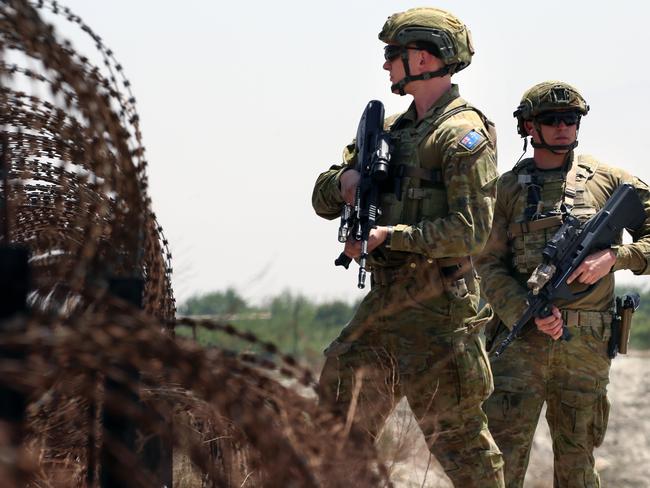
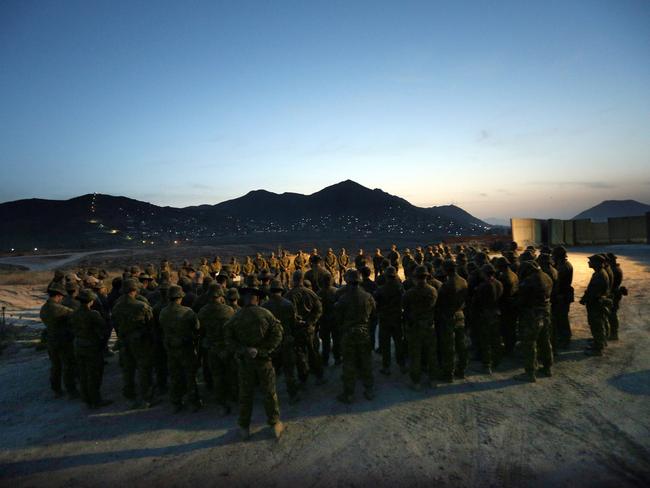
The response has been an escalation of foreign force deployment; as late as last week fresh German personnel arrived, that country’s parliament authorising a boost from 980 to 1,300 deployed soldiers. The US has an estimated 16,000 troops and another 15,000 from NATO and some 30-odd nations.
Aside from the Taliban — that is considering becoming involved in elections later this year to semi-legitimise as a political entity as Sinn Fein did in Northern Ireland — there is the emergence of Islamic State Khorasan Province (ISKP).
The terror group is launching attacks indiscriminately including against the Taliban that it sees as surrendering.
The Australian Parliament earlier this year proscribed the group as a terror threat against the West and Australia.
The number of ISKP in Afghanistan north is confused since intelligence points to Uzbek and Pakistani militants including factions of Lashkar-e-Taiba rebadging themselves as ISKP.

Into the mix also, the Afghan guerrilla Haqqani terror group whose sole mission is to attack US, coalition and NATO forces. The Afghan military will also tell you Russia, Iran and Pakistan are also quietly supporting insurgency in a bid to secure their own borders and ensure the battlefront points inwards toward Kabul.
Some analysts can see a spiral where a collapsed Afghanistan would destabilise the fragile and fractured Pakistan and that the domino would fall on the weak region of Central and South Asia. All the while, old foes al-Qaeda sit back and wait for an opportunity to bring the groups together under the ancient proverb ‘the enemy of my enemy is my friend’.
It is against this backdrop the ADF is in Afghanistan on an intense training, advise and assist mission to get local forces, hammered by three decades of war, up to scratch to combat threats for themselves.
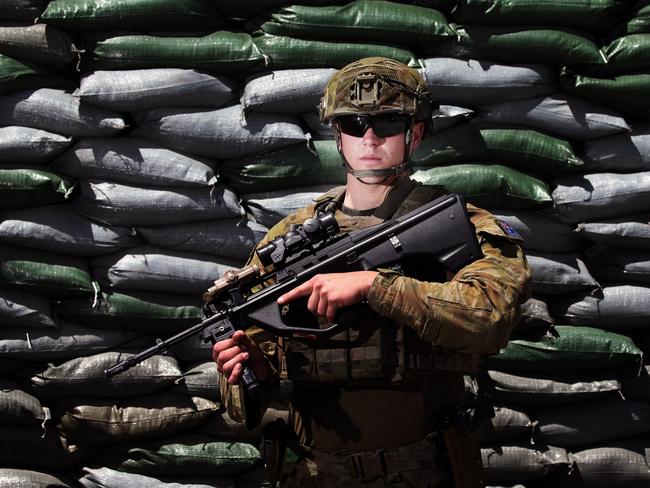
The mentoring program includes advising the Afghan multi-agency Kabul Garrison Command that coordinates the Army, police, intelligence and other critical services.
The ADF’s highest-ranking officer in NATO’s Afghan operations Brigadier John Shanahan said Australia was making a difference.
“Kabul Garrison Command is the lead for the security of Kabul and the fact Australians are the lead nation advising it is quite outstanding, reflects well on the experience we have had over the years, obviously we have been here for a number of years now and speaks of our international standing,” he said.
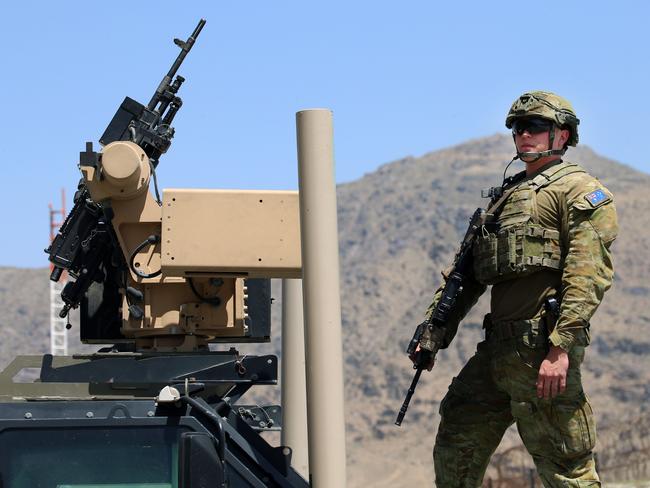
For Colonel Niazi it’s not just the critical academic training in tactics and rule of law the ADF is providing to senior officers but more critically the leadership skills for the young generations of Afghans who will lead the country.
“We need good leadership and our friends (Australians) are teaching us to teach them these leadership skills, these mentors have lots of experience,” he said.
“For many, they have not faced a good day in Afghanistan where every day is war … but these men and women are the future and with the help of our friends in the coalition we can connect hands and finally bring peace.”
Originally published as Afghanistan army relying on Australia’s help to keep the country together


